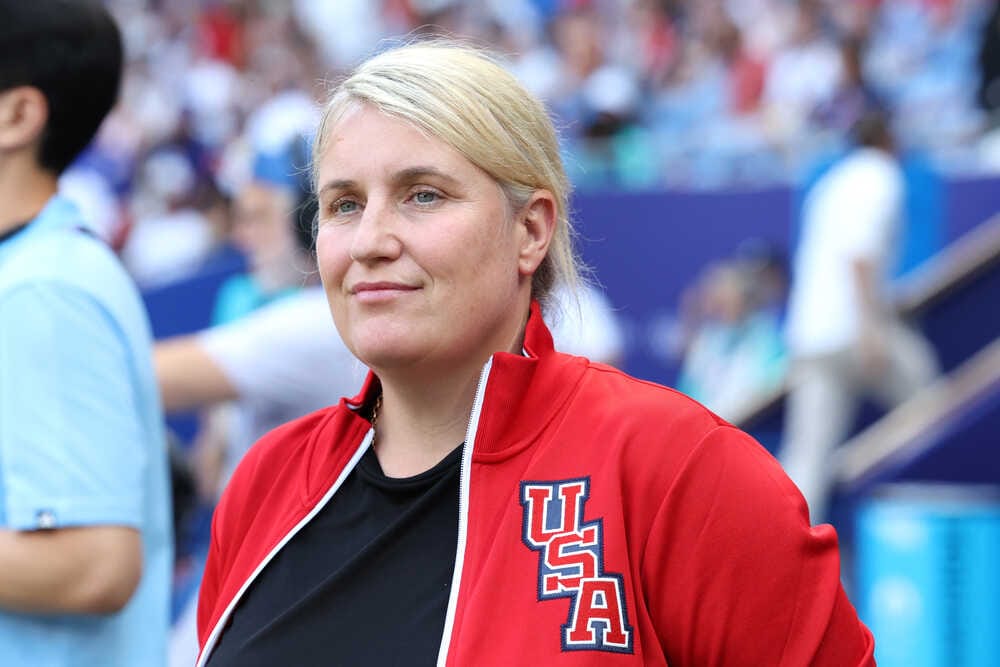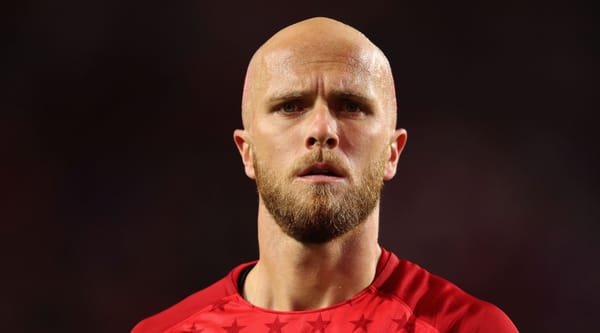Emma Hayes Takes US National Team Back To The Top

By James Nalton.
The United States women’s team (USWNT) returned to the top of the FIFA women’s world rankings on Friday thanks to their gold medal triumph at the Paris Olympics last Saturday.
Their 1-0 victory against Brazil led to the surprisingly rare occurrence of British success in an Olympic football tournament, but even though the USWNT now have an English head coach, this is very much still a victory for American women’s soccer.
Emma Hayes stepped into the USWNT job in May after leaving Chelsea. She spoke in her numerous interviews following this whirlwind of a few months, culminating in Olympic gold, about her links to American soccer.
"I love America,” Hayes said in a post-match interview for NBC. "It made me. And I always say that. It definitely made me.”
These were not just soundbites to please a jubilant American audience that was savouring their return to the top.
Hayes is as much an American soccer coach as she is a British one.
She found opportunities in football in the States that she was unable to find in England, moving to the US to coach various teams in New York state in the early 2000s, and the Chicago Red Stars from 2008 to 2010.
Though she is known for her successful stint at Chelsea which included seven Super League titles and five FA Cups, Hayes developed her coaching skills in the US.
"America means more to me than most people realize,” she said in a press conference after the win against Brazil in the final.
“I was a 20-year-old who'd come from a pretty stuffy society that didn't embrace the women's game and women in football.
"I went to America and they looked after me, they nurtured me, they opened doors for me, and they gave me opportunities that England never, ever gave me.
“I'm just so happy, so happy to repay that faith in me. I'm a delighted half-American today."
Coaches aren’t officially awarded medals along with athletes at the Olympics, but there are calls back in the US for Hayes to receive some kind of recognition or memento.
The USWNT coach did post a photo on Instagram of her showing off a gold medal in front of the Eiffel Tower, so maybe such a keepsake was eventually arranged. “Good morning USA,” Hayes posted. “I’m gonna milk it for one week so forgive me.”
The United States has long been a major force in women’s football, owing a lot to its college system where soccer is a popular women’s sport.
At professional club level, even amid the growth and increased professionalism of other leagues around the world, America’s National Women’s Soccer League (NWSL), remains one of the top women’s football leagues in the world.
At international level, prior to the 2023 edition where they were knocked out in the last 16, the USA had never finished lower than third at the Women’s World Cup. They won the inaugural tournament in 1991 which was the first of their four total wins, including back-to-back triumphs in 2015 and 2019.
That worst-ever World Cup finish in 2023 led to the resignation of coach Vlatko Andonovski and saw the USA lose the top spot in the FIFA rankings for the first time since 2017.
Enter Emma Hayes and the task of returning this team to its former glory, starting with the immediate task of winning Olympic gold. The players were still considered good enough, but now they needed something extra to reclaim their status as the top team in the world.
This task is more difficult than ever for the USWNT. Hayes only had a couple of months to prepare the team for the Olympics, taking over as their head coach in May at the end of the 2023/24 Women’s Super League season with Chelsea.
It has been made even more challenging as the rest of the world has begun to catch up, not only with the NWSL but with the national team, too.
That 2023 World Cup, where they only won one of their four games, showed as much, but their Olympic Games record was also telling.
Until 2012, the USWNT had dominated the Games since women’s football was first introduced as an Olympic sport in 1996, aptly in Atlanta, where they won gold.
Further gold medals followed at three of the next four Olympics, only missing out in Sydney in 2000 where they lost in the final against Norway to the most golden of golden goals scored by Dagny Mellgren.
Going into 2024, the 2012 London Olympics was the last time they had won gold, and the Games in 2016 and 2020 were a sign of the new challenges facing the American team as they only reached the quarter-finals in Rio and won bronze in Tokyo.
As various other nations around the world started to give more attention to and invest more money in women’s football, the USA faced increasingly stiff opposition.
The rest of the world was catching up to the athletic ability of the USA players that had stood them in good stead for so long.
The USWNT had begun to face challenges throughout tournaments rather than just in semifinals and finals.
The narrative around Hayes’s first major tournament as USWNT coach started with boundless optimism thanks to three wins from three in the group stage and nine goals scored. Declarations were made that the USA were back!
The cruise to the finish line in the group stage gave way to a scrappy, long-distance steeplechase of a knockout tournament.
Hayes began to be criticised for not rotating the team and not making changes sooner within games.
The quarterfinal against Japan (where the USA didn’t make a sub until the 91st minute) and the semifinal against Germany were both won by single goals in extra time following attritional displays.
When Sofia Smith scored the winner in extra time against Germany to send the USA to the final, she collapsed like a long-distance runner crossing the finish line following a sprint down the final straight.
The endurance, the togetherness, the teamwork and the importance of the coach made this feel like the most Olympic of Olympic golds for the USA.
It served as a gruelling team bonding exercise. “Connections help,” Hayes said after the win against Japan. “I don’t believe we’d have gone through if we’d have made too many changes.”
The final against Brazil was also won by a single goal, scored by Mallory Swanson, but on this occasion required no extra time.
The plaudits for the football played in the group stage turned into plaudits for navigating the knockouts, regardless of how.
For the USWNT in this tournament, winning is what mattered, and the quest for another sustained stint at the summit of football begins.
Though Hayes does not have stars and stripes next to her nationality, she is very much an American soccer coach.
"I've always had belief. Winning is in my DNA,” she added in a post-tournament press conference.
“I'm used to being in finals and competing for trophies and so is the US women's national team. The mentality this team have — the never-say-die attitude — it's why I love the country, it's why I'm so made for it.
"We're delighted we have a gold medal, but it doesn't mean it ends there. We want so much more because we're competitors. We're just at the beginning."
This article was originally published in the Morning Star newspaper on Saturday, August 17, 2024.



